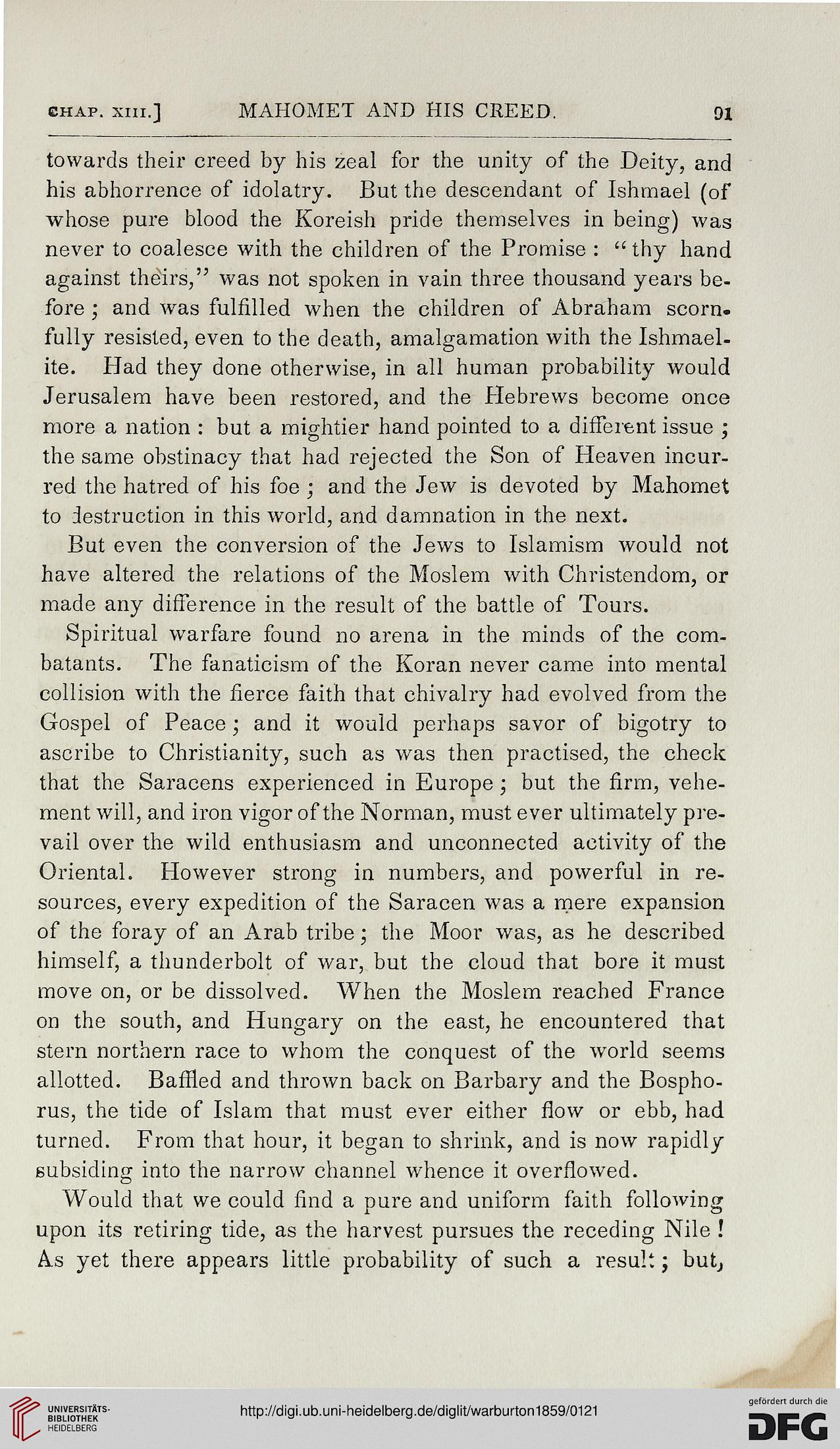CHAP. XIII.]
MAHOMET AND HIS CREED.
01
towards their creed by his zeal for the unity of the Deity, and
his abhorrence of idolatry. But the descendant of Ishmael (of
whose pure blood the Koreish pride themselves in being) was
never to coalesce with the children of the Promise : " thy hand
against theirs," was not spoken in vain three thousand years be-
fore ; and was fulfilled when the children of Abraham scorn,
fully resisted, even to the death, amalgamation with the Ishmael-
ite. Had they done otherwise, in all human probability would
Jerusalem have been restored, and the Hebrews become once
more a nation : but a mightier hand pointed to a different issue ;
the same obstinacy that had rejected the Son of Heaven incur-
red the hatred of his foe ; and the Jew is devoted by Mahomet
to iestruction in this world, and damnation in the next.
But even the conversion of the Jews to Islamism would not
have altered the relations of the Moslem with Christendom, or
made any difference in the result of the battle of Tours.
Spiritual warfare found no arena in the minds of the com-
batants. The fanaticism of the Koran never came into mental
collision with the fierce faith that chivalry had evolved from the
Gospel of Peace ; and it would perhaps savor of bigotry to
ascribe to Christianity, such as was then practised, the check
that the Saracens experienced in Europe ; but the firm, vehe-
ment will, and iron vigor of the Norman, must ever ultimately pre-
vail over the wild enthusiasm and unconnected activity of the
Oriental. However strong in numbers, and powerful in re-
sources, every expedition of the Saracen was a mere expansion
of the foray of an Arab tribe; the Moor was, as he described
himself, a thunderbolt of war, but the cloud that bore it must
move on, or be dissolved. When the Moslem reached France
on the south, and Hungary on the east, he encountered that
stern northern race to whom the conquest of the world seems
allotted. Baffled and thrown back on Barbary and the Bospho-
rus, the tide of Islam that must ever either flow or ebb, had
turned. From that hour, it began to shrink, and is now rapidly
subsiding into the narrow channel whence it overflowed.
Would that we could find a pure and uniform faith following
upon its retiring tide, as the harvest pursues the receding Nile !
As yet there appears little probability of such a result; but,
MAHOMET AND HIS CREED.
01
towards their creed by his zeal for the unity of the Deity, and
his abhorrence of idolatry. But the descendant of Ishmael (of
whose pure blood the Koreish pride themselves in being) was
never to coalesce with the children of the Promise : " thy hand
against theirs," was not spoken in vain three thousand years be-
fore ; and was fulfilled when the children of Abraham scorn,
fully resisted, even to the death, amalgamation with the Ishmael-
ite. Had they done otherwise, in all human probability would
Jerusalem have been restored, and the Hebrews become once
more a nation : but a mightier hand pointed to a different issue ;
the same obstinacy that had rejected the Son of Heaven incur-
red the hatred of his foe ; and the Jew is devoted by Mahomet
to iestruction in this world, and damnation in the next.
But even the conversion of the Jews to Islamism would not
have altered the relations of the Moslem with Christendom, or
made any difference in the result of the battle of Tours.
Spiritual warfare found no arena in the minds of the com-
batants. The fanaticism of the Koran never came into mental
collision with the fierce faith that chivalry had evolved from the
Gospel of Peace ; and it would perhaps savor of bigotry to
ascribe to Christianity, such as was then practised, the check
that the Saracens experienced in Europe ; but the firm, vehe-
ment will, and iron vigor of the Norman, must ever ultimately pre-
vail over the wild enthusiasm and unconnected activity of the
Oriental. However strong in numbers, and powerful in re-
sources, every expedition of the Saracen was a mere expansion
of the foray of an Arab tribe; the Moor was, as he described
himself, a thunderbolt of war, but the cloud that bore it must
move on, or be dissolved. When the Moslem reached France
on the south, and Hungary on the east, he encountered that
stern northern race to whom the conquest of the world seems
allotted. Baffled and thrown back on Barbary and the Bospho-
rus, the tide of Islam that must ever either flow or ebb, had
turned. From that hour, it began to shrink, and is now rapidly
subsiding into the narrow channel whence it overflowed.
Would that we could find a pure and uniform faith following
upon its retiring tide, as the harvest pursues the receding Nile !
As yet there appears little probability of such a result; but,





